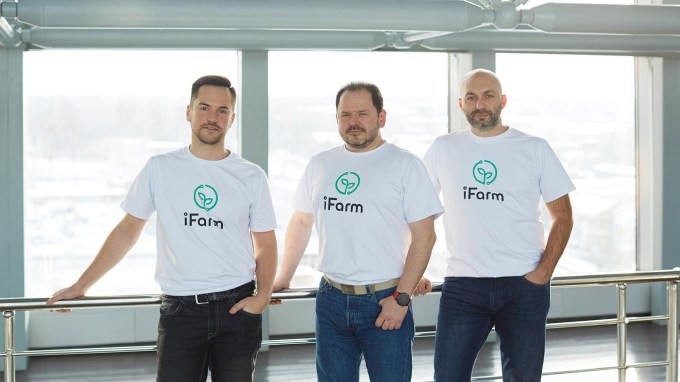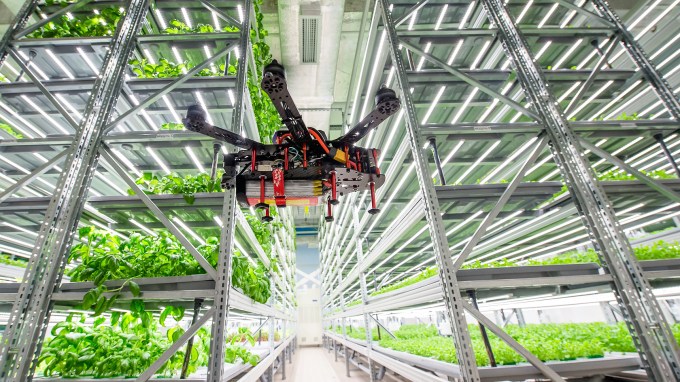Vertical farming technology provider iFarm has bagged a $4 million seed round, led by Gagarin Capital, an earlier investor in the startup. Other investors in the round include Matrix Capital, Impulse VC, IMI.VC and several business angels.
The Finnish startup is focused on providing software that enables others to carry out vertical farming — targeting sales at food processing companies and FMCG giants, as well as farmers, university research centers and even large corporates with their own catering needs, as a result of operating large physical office footprints.
Its software as a service platform automates crop care for plants such as salad greens, cherry tomatoes and berries grown in vertical stacks. The system involves a range of technologies to monitor and automate crop care, applying computer vision and machine learning and drawing on data on “thousands” of plants collected from a distributed network of farms, per iFarm.
At this stage it’s providing technology to around 50 projects in Europe and the Middle — covering a total of 11,000square-meters of farm. Its platform is currently able to automate care for around 120 varieties of plants, with the goal of getting to 500 by 2025 (it says ten new crop varieties are being added each month).
“iFarm started three years ago, with three founders. The goal is to build technology… for growing tasty and healthy food that we already eat,” says co-founder and CBDO Max Chizhov, who notes the business has grown to 15 employees along the way.
“We started from a greenhouse. First year just looking for technologies — which kind of technologies to use. After one year of experiments we have some pilots and now we are focused on indoor farming, vertical farming.”
Vertical farming is an urban farming technique that involves stacking plants in dense layers in a highly controlled indoor environment, using LED lighting to replace sunlight to power all-year-round agriculture.
iFarm notes that the fully automated approach also means there’s no need for pesticides to grow a range of edible greens, herbs, fruits, flowers and vegetables. There are some natural limits on what can be grown within such systems — taller plants and trees obviously can’t be squeezed into stacks. Deep root vegetables also aren’t suitable, although iFarm touts baby carrots among its product portfolio.
“We focus on profitable products,” says Chizhov. “Small crops, very fast growing crops, and easy to irrigate and easy to grow in many layers. Many layers is the advantage of indoor farms.”

Photo credit: iFarm
While there are now hundreds of vertical farming startups whose business model is fixed on selling the edible produce they grow, such as to supply supermarkets and other food retailers, iFarm is purely focused on developing technologies to support automated indoor agriculture.
o it might, for instance, be eyeing the likes of Infarm, Bowery and Plenty as potential customers for its vertical farming optimization technologies.
It says its systems can be applied to vertical farms of 20 to 20,000 square meters, supporting scalability.
“Our main advantage is we know how to grow and you don’t need any special technologies to know how to grow. All of our algorithms, all of the data, is based in our software,” says Chizhov, emphasizing the software is hardware agnostic — meaning customers don’t need to use iFarm’s kit for their vertical farms but just can apply its algorithms to their own set-ups.
iFarm has designed various bits of vertical farm hardware it can supply, or co-develop with customers, per Chizhov, such as fertilizer units and LED lighting. But the software as a service platform isn’t locked to any specific piece of kit.
“The main thing is the software that combines optimization systems like humidity, temperature, CO2 etc; and some business separations — like why, how, when we start growing, which clients,” he says, adding: “It’s like a CRM plus an ERP system that controls all the parameters.
“In this system we use computer vision systems. We use AI for increasing taste [of the edible produce], increasing yield parameters of our growing crops. We also use drones which fly in our farms and observe all of our greens and all of our plants. We optimize all of the processes in the farm using software and some [pieces of hardware] that use the software.”
Chizhov says the seed funding will be used to gradually expand the business into new regions — with a launch into the US market on the cards in two years’ time — but the main priority now is to spend on further software development.
“The main goal is [adding] new type of crops,” he notes. “Research, development, new products.”
On the competitive front, iFarm is not the only technology provider seeking to sell to the burgeoning vertical farming sector. Chizhov says there are around ten to 15 similar agtech startups. But he contends its tech and approach has the edge over the likes of UK-based Intelligent Growth Solutions, Belgium’s Urban Crop Solutions, Switzerland’s Growcer, US ‘container farms’ provider Freight Farms, or China’s Alesca Life, to name-check a handful of other players in the space.
“There are some companies in this market that also provide solutions but with less optimization, with less software value and with less product mix/product line,” he argues. “The main difference is the type of crops; it’s software that we provide for our clients — because you don’t need to know how to grow; you don’t need to be a specialist in your company you just push a button. And we provide excellent services for our clients. Design, installation, operation, help to sell the final product etc.”
Chizhov also notes iFarm has filed patents to protect some of its technologies.

Photo credit: iFarm
Mikhail Taver, GP of Gagarin Capital, who is the lead investor in iFarm’s seed round, says the startup stood out on account of having a competitive advantage in the sector. Although he also notes that the fund’s agtech strategy is focused on indoor farming rather than mainstream outdoors — which again makes iFarm a good fit.
“We do see a large potential in the sector with the [world’s] rising population. We see the increasing demand for food — it’s only going to continue. We see global warming and general sustainability issues. And iFarm seems to be able to solve most of those,” Taver told TechCrunch.
“I don’t really see much competitors able to grow things other than greens,” he added, elaborating on the competitive edge claim. “You don’t normally get proper tomatoes or edible flowers and things like that grown in vertical farms. They mainly concentrate on a couple of salads at most.
“Plus most of our competitors they focus on competing with actual farmers, whereas we’re trying to augment them. We don’t try to force them off the market — we’re trying to help them get bigger. Which is a totally different approach and it should be working better. At least that’s what I believe.”
https://ift.tt/3iZJVHG Agtech startup iFarm bags $4M to help vertical farms grow more tasty stuff https://ift.tt/31fWLvf













0 comments
Post a Comment